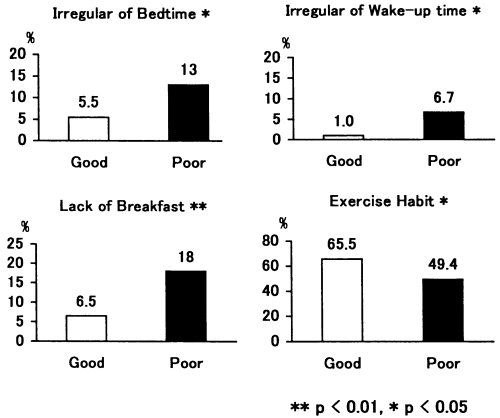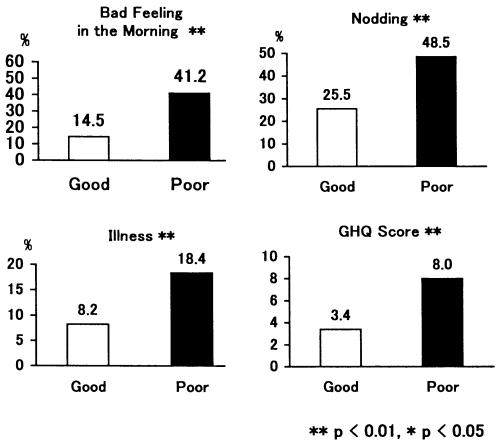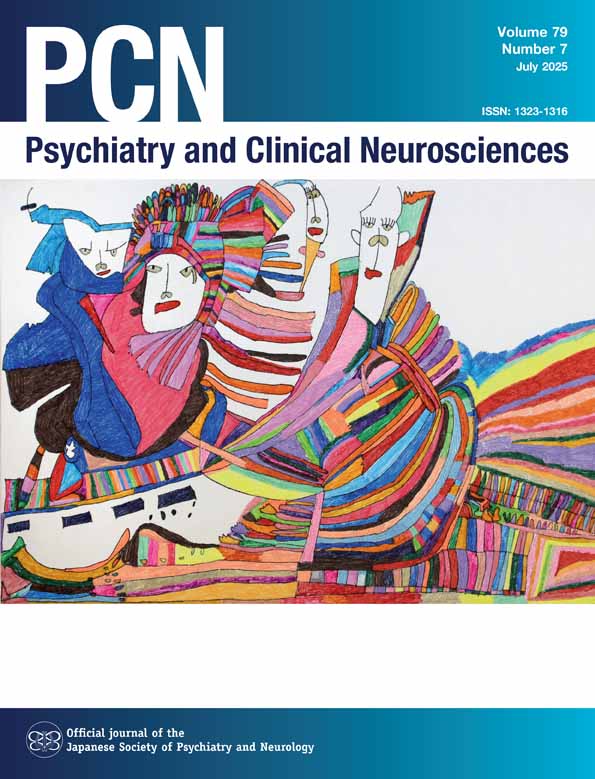An examination of sleep health, lifestyle and mental health in junior high school students
Abstract
Abstract The factors that influence sleep health and mental health in junior high school students’ lifestyles was examined. The proportion of students who replied that they feel bad in the morning, and who do not have breakfast was significantly higher in poor sleepers. The proportion of students who regularly take exercise was significantly lower among poor sleepers. Compared with good sleepers, poor sleepers had a higher number of illnesses and their General Health Questionnaire score was worse. The study’s results suggest that sleep health is closely related to both physical and mental health, and that habits such as exercise, and regular sleeping and eating, are important for maintaining and improving students’ sleep health.
INTRODUCTION
It has been pointed out previously that lack of sleep or having sleep disorders may suppress brain function and diminish the ability to learn, concentrate or control the mind.1,2 It is often observed that today’s adolescents have nocturnal lifestyles and shorter sleeping hours. The present study examined the factors that influence sleep health and mental health in junior high school students’ lifestyles.
METHODS
A survey of 805 students attending junior high schools in Okinawa prefecture was carried out during the autumn 2001. By analysing the questionnaire3 about their lifestyles and sleep health, five risk factors in sleep health were determined, which were classified as follows: (i) sleep maintenance problems; (ii) parasomnia-like problems; (iii) sleep apnea; (iv) difficulty in waking up; and (v) difficulty in initiating sleep. Furthermore, the total score of each factor was calculated according to a sleep health risk index,3,4 which categorized 200 (25% higher ranking) subjects as being in the poor sleep health group, and 200 (25% lower ranking) subjects as being in the good sleep health group. These two groups were then compared. Mental health was assessed using the General Health Questionnaire (GHQ).5
RESULTS
The sleep health risk index of the poor sleep health group was significantly higher than that of the good sleep health group (0.8 ± 0.3 vs 3.9 ± 1.1; P < 0.01). Figure 1 compares the lifestyles of the good sleep group with the poor sleep group. The rate of students who go to bed and wake up irregularly was significantly higher in the poor sleep health group. Furthermore, the proportion of students who regularly take exercise was significantly lower and the number of students who do not eat breakfast was significantly higher in the poor sleep group. Figure 2 compares both physical and mental health of the good sleep group with the poor sleep group. The proportion of students who reported that they felt bad in the morning and the proportion of students who dozed during the day was significantly higher in the poor sleep health group. Compared with the good sleep group, the poor sleep group had a higher number of illnesses and the GHQ score was worse. The GHQ score and sleep health risk index had an important significant positive correlation (0.33, P < 0.01).

. Lifestyle comparison between good and poor sleepers.

. Comparison of nodding, and physical and mental health between groups.
DISCUSSION
A recent survey of 3754 junior high school students has reported that the habit of staying up late not only contributes to students’ sleepiness during classes, but also results in the deterioration of sleep health, poor dietary habits, and increased incidence of illness.6 Furthermore, the results of the research demonstrated that the aggravation of sleep health caused by the delay of the sleep phase, sleep debts and irregularity of sleep habits, is related to the lack of having breakfast, and poor physical and mental health. In short, the deterioration of sleep health is closely related to the physical and mental health of junior high school students. The issue of sleep quality at this stage in life is not a problem pertinent only to educators; it is of vital importance to life-long health management. The results of the present study suggest that habits such as exercise and regular sleeping and eating are important in maintaining and improving sleep health, and that sleep health is closely related to junior high school students’ physical and mental health.




